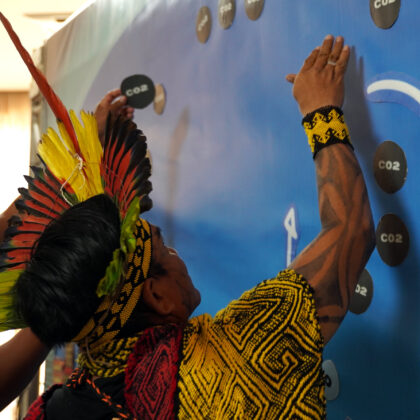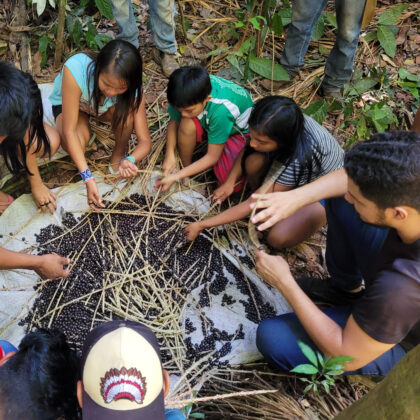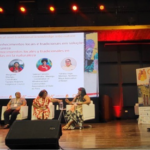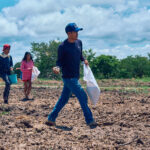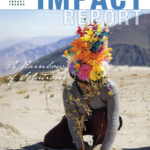Supporting indigenous and forest communities to thrive in their homelands is one of the most effective safeguards against deforestation and is essential for climate resilience.
Indigenous and local communities are some of the most effective guardians of the forest– when they are protecting their lands from deforestation, they are also preserving carbon sinks, biodiversity, and irreplaceable traditional knowledge.
But these defenders face unrelenting pressures on their territories from agriculture, logging, mining, and illegal activities – and often experience violence or political repression in the process. They need effective partnerships to help keep their forests standing and secure their rights. They also need support to create sustainable economic alternatives for themselves.
We work in Latin America, home to 50% of the world’s remaining tropical forests, one quarter of which are inhabited and guarded by indigenous and local communities. We partner with these stewards to secure their rights, conserve their forests, and strengthen their cultures and livelihoods.
Our approach
We focus on local strategies, creating direct, measurable benefits for forest communities. Doing so also contributes to global climate goals that benefit all of us. We use a “territorial governance” approach, proven over twenty years of work with indigenous partners.
Governance, simply put, means the ability of a community to manage their lands, resources, food security, and healthcare in ways that align with their cultures and worldviews. The traditional systems of governance that have served indigenous people over millennia are today often overwhelmed by the powerful economic drivers behind deforestation.
Strengthening territorial governance involves three essential pillars:
1) Economic self determination
Many traditional communities are striving to strike a balance between market engagement and their relationship with their land, traditions, and well-being. Communities must be able to participate in markets on their own terms, in building viable and equitable local economies that sustain biodiversity and cultural values. We catalyze sustainable forest enterprises around Brazil nut, cacao, coffee, and other non-timber forest products, and establish strong market relationships that protect the forest and nurture local communities. We also help community members build entrepreneurial skills and facilitate market connections to strengthen self-sufficiency. A few of our most successful ongoing projects include: Canopy Bridge, the Cumari Rainforest-to-Table project, the TUCUM online sales platform for artisans.
2) Advocacy
Communities need resources to advocate for their rights and economic sovereignty, and to fully engage with governments, companies, and donors. Our Capacity Building Program on Indigenous Territorial Governance brings learning opportunities to communities and trains new leaders, strengthening their ability to protect biodiversity and the well-being of generations to come.
3) Cultural integrity
Indigenous communities have experienced rapid cultural change. There is a need for spaces to reaffirm their ethnic identities, build awareness of fundamental rights, and help young indigenous people bridge the cultural divide for a more equitable and sustainable world. We developed the Cultural Mediators program, which trains teachers and develops educational materials for young indigenous students about territorial governance, natural resource management, climate resilience, and cultural traditions. We also support “living pharmacies,” which are traditional medicinal centers and production systems that rely on traditional knowledge.
Key Results
- Leveraged $9M for community enterprises, advocacy, and cultural initiatives.
- Advocated for 30 laws benefitting indigenous people and local communities’ rights in 7 regions in Latin America.
- Projects to secure rights, livelihoods, and cultures have benefitted 12,000 people to date.
- Contributed to the conservation of 1.8M hectares of Amazon rainforest.
- Increased indigenous artisans’ incomes by 10% via artisan cooperatives.
- Established the first indigenous-led conservation project financed through the sale of carbon offsets, together with the Surui people.
- Developed 50 technical publications and videos for communities.
Key Resources

